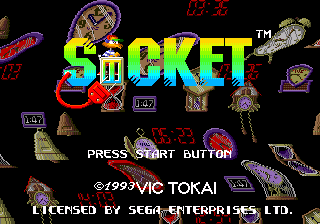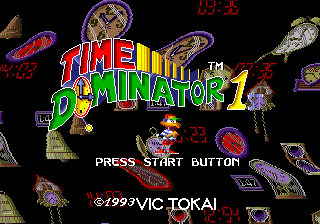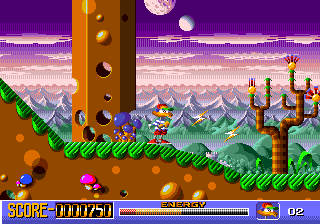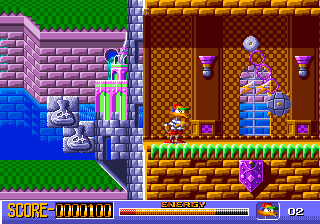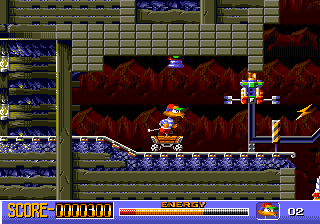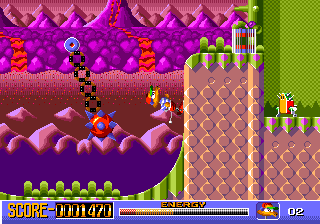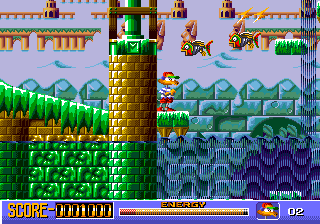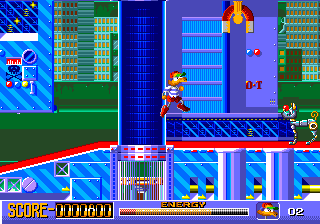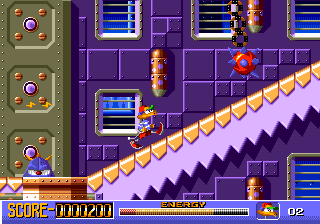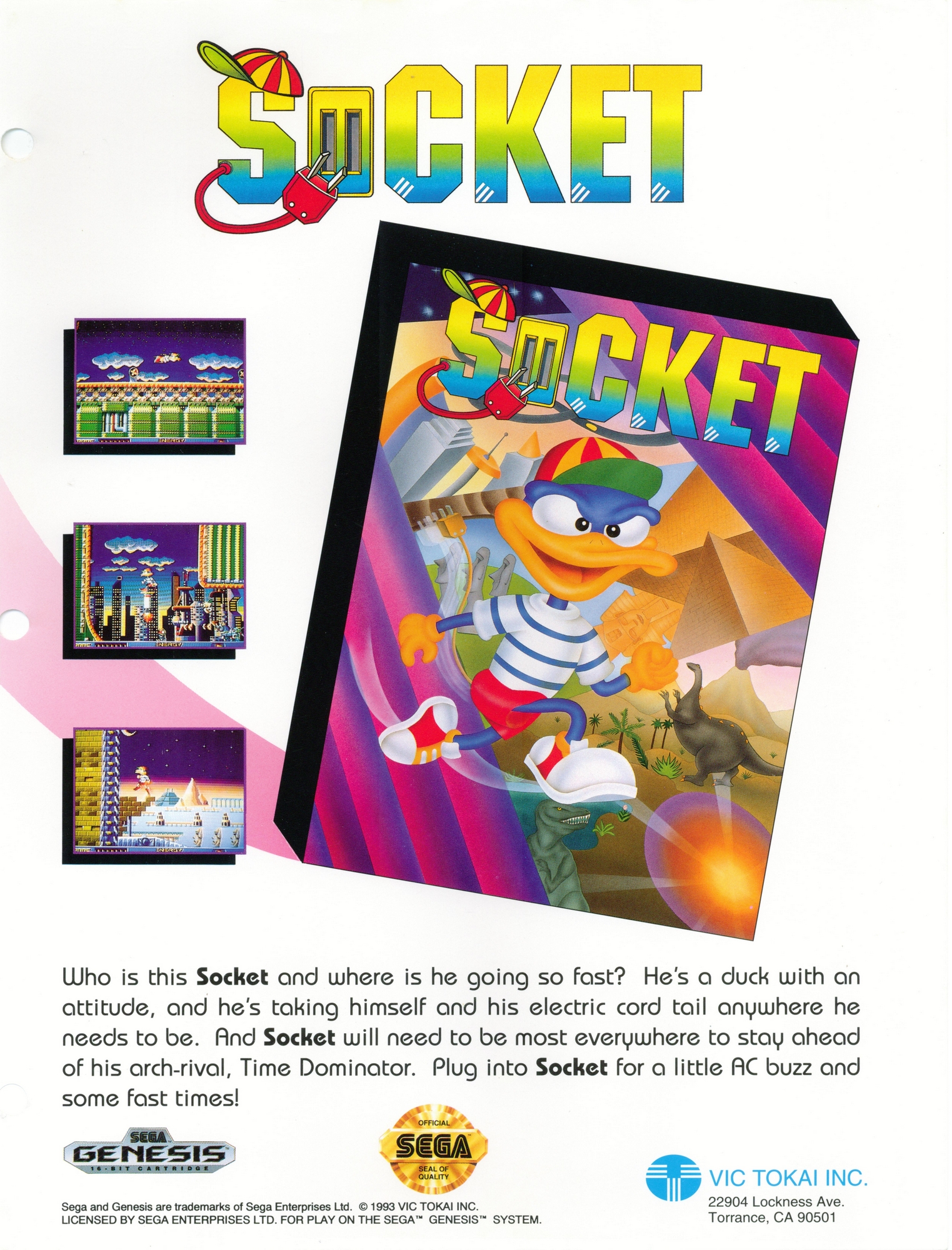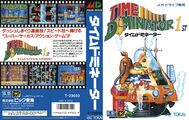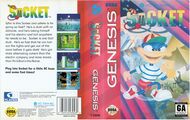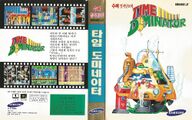Socket
From Sega Retro
| ||||||||||||||||||||
| Socket | ||||||||||||||||||||
|---|---|---|---|---|---|---|---|---|---|---|---|---|---|---|---|---|---|---|---|---|
| System(s): Sega Mega Drive | ||||||||||||||||||||
| Publisher: VIC Tokai | ||||||||||||||||||||
| Developer: VIC Tokai, Graphic Research (sound) | ||||||||||||||||||||
| Distributor: Samsung (KR) | ||||||||||||||||||||
| Sound driver: GRC/later custom | ||||||||||||||||||||
| Genre: Action[1][2] | ||||||||||||||||||||
| Number of players: 1 | ||||||||||||||||||||
|
Socket, known as Time Dominator 1st (タイムドミネーター 1st) in Japan, is a Sega Mega Drive action platform game developed and published by VIC Tokai. Released in the United States in August 1993, it was later released in Japan in March 1994. The game is a mascot platformer, with the protagonist's design and overall gameplay significantly influenced by Sonic the Hedgehog.
Socket was the subject of mixed reviews at the time of release. Sega Zone gave the game the lowest possible score on the basis that it was a Sonic clone[3].
Contents
Story
It is the year 2902, and the evil Time Dominator has finished constructing a time machine which has allowed him to steal various goods and treasures from the past. However, his actions have caused a warp in the flow of time, and a Time Warp Patrol was quickly established to monitor this time warp. Well aware of the need to stop this time warp, the Time Warp Patrol commissions Socket (Minute in the Japanese version), a time-travelling android duck, to stop the treachery of the evil Time Dominator.
Gameplay
Socket borrows many elements from Sonic the Hedgehog and its sequels, causing it to be labelled as a "Sonic clone". Like Sonic, there is an emphasis on speed, with the game offering several "High Speed Areas" in an attempt to woo fans of Sega's game. There are also "labyrinth" areas, which have a greater emphasis on exploration of the level. Items are collected by destroying capsules, similar to Sonic.
![]() and
and ![]() make Socket/Minute jump, while
make Socket/Minute jump, while ![]() allows him to kick, acting the primary method of defense within the game. As the name may suggest, Socket/Minute requires electricity to keep going, and so must collect lightning bolts in order to stay alive. His health will otherwise deteriorate over time. Socket/Minute has a machine allowing him to travel through time, so each level is set in a different time period as well as setting. Continues are awarded every 30,000 points.
allows him to kick, acting the primary method of defense within the game. As the name may suggest, Socket/Minute requires electricity to keep going, and so must collect lightning bolts in order to stay alive. His health will otherwise deteriorate over time. Socket/Minute has a machine allowing him to travel through time, so each level is set in a different time period as well as setting. Continues are awarded every 30,000 points.
In addition the main game, a Time Trial mode is also offered. This mode sees the player run through a "High Speed Area" without any enemies and achieve the fastest possible time.
Items
Item containers can be kicked open to obtain the item inside.
| Energy | |
|---|---|
| Small lightning bolts of energy that refill the energy bar. | |
| 1UP | |
| Gives Socket/Minute an extra life. | |
| Barrier | |
| Gives Socket/Minute a shield that protects him from losing energy from a single hit. His energy will still decrease on its own, however. | |
| Invincible | |
| Makes Socket/Minute temporarily invincible. | |
| Checkpoint | |
| When activated, Socket/Minute can continue from a checkpoint after losing a life. | |
| Charging Station | |
| Socket/Minute charges at an energy station at the start of every level, and another one waits at the end of every level as the goal. |
Levels
Stages in Socket follow a format rarely seen in other games - they are split into three "sub-stages", each sporting a different change of pace. The first sub-stage is merely called a "High Speed Area", playing to the fast speeds of Socket. High Speed Areas have their own set of graphics and could be seen as completely independent stages, but the game classes them as part of a three-Act stage. High speed areas presumably are what Socket must overcome in order to travel through time and reach his destination. In the Japanese version, the High Speed Areas are arranged differently.
The second sub-stage, now set in a specific time period, is deemed an "Athletic Area", resembling more of what the player might see in a Sonic the Hedgehog platformer. They are a more balanced mixture of running and jumping than the high speed areas.
The third and final sub-stage is called a "Labyrinth Area", and is much like the above aside from the fact that Socket needs to find a door (i.e. there is a need for exploration). Going through that door will inevitably put Socket up against the boss, which in most cases is Time Dominator. Other doors will send him to a mini-game area.
| Emerald Forest | |
|---|---|
| Emerald Forest is a typical grassland level with bizarrely-shaped trees, mushrooms and hidden passageways inside walls. Some platforms are held afloat by balloons, which will pop shortly after Socket/Minute stands on the platforms. | |
| Treasure Castle | |
| A medieval-like castle that is filled with various traps, such as swinging spike balls, crushing stakes embedded in the ceilings, and strong winds that will push Socket/Minute backwards. Stone blocks with clown faces on them are frequently used for platforming. | |
| Olein Cavern | |
| As its name suggests, Olein Cavern is set inside a spacious geothermal mine that sees Socket/Minute riding around sections in minecarts capable of traversing sloped rails. Mechanisms placed around the level can transport minecarts to higher elevations should Socket/Minute bring one to them. Rockets can transport Socket/Minute to higher places, while buzzsaws serve as hazards on the rails.
This is the only stage in the game where its "High Speed Area" uses the same tileset as the rest of the stage instead of the regular tileset used by other "High Speed Areas". | |
| Stone Age | |
| Set in the very distant past, Stone Age is a harsh landscape filled with many volcanic hazards such as lava pools, lava geysers and erupting volcanoes. Some of the prehistoric trees have flower buds that will spit downward at Socket/Minute when he passes under them, and bridges will collapse when crossed. | |
| Antiquity | |
| Set in ancient ruins, Antiquity is the token water level of the game, and as such is filled with water in the lower parts of the stage. While Socket/Minute cannot drown, the water will slow his movements and make his jumps floaty, however he is capable of paddling for a burst of speed or to slow his fall. Pillars embedded in the floors and ceilings will attempt to crush Socket/Minute, and hatches in the underwater areas will release harmful vortexes. | |
| Future | |
| This stage, set in a futuristic city, is an industrial-themed stage with many mechanical hazards, including buzzsaws, flame traps, and electromagnets that will trap Socket/Minute in place until they periodically power down. Socket/Minute can use snake blocks that move in set patterns as platforms, as well as elevators to reach higher places. The "Labyrinth" area features sections where Socket/Minute will activate a machine that reverses gravity, making him walk on the ceiling. | |
| Time Castle | |
| The final stage of the game, which is set in Time Dominator's stronghold. Some of the platforms here are operated in various ways, such as having to step on floating buttons to spawn a platform, or to run along on a platform's treadmill to get it moving. |
Development
A Super Nintendo Entertainment System port of the game was planned, but eventually cancelled.
Versions
Localised names
| Language | Localised Name | English Translation |
|---|---|---|
| English (US) | Socket | Socket |
| Japanese | タイムドミネーター 1st | Time Dominator 1st |
| Korean | 타임 도미네이터 | Time Dominator |
Production credits
- Main article: Socket/Production credits.
Magazine articles
- Main article: Socket/Magazine articles.
Promotional material
also published in:
- Electronic Gaming Monthly (US) #52: "November 1993" (1993-xx-xx)[4]
Physical scans
| Sega Retro Average | |||||||||||||||||||||||||||||||||||||||||||||||||||||||||||||||||||||
|---|---|---|---|---|---|---|---|---|---|---|---|---|---|---|---|---|---|---|---|---|---|---|---|---|---|---|---|---|---|---|---|---|---|---|---|---|---|---|---|---|---|---|---|---|---|---|---|---|---|---|---|---|---|---|---|---|---|---|---|---|---|---|---|---|---|---|---|---|---|
|
| 58 | |
|---|---|
| Based on 13 reviews | |
Technical information
- Main article: Socket/Technical information.
References
- ↑ File:Socket md jp cover.jpg
- ↑ 2.0 2.1 https://sega.jp/history/hard/megadrive/software_l.html (Wayback Machine: 2020-07-02 23:21)
- ↑ 3.0 3.1 Sega Zone, "January 1994" (UK; 1993-12-23), page 58
- ↑ Electronic Gaming Monthly, "November 1993" (US; 1993-xx-xx), page 119
- ↑ 1700 igr dlya Sega, "" (RU; 2001-xx-xx), page 212
- ↑ Beep! MegaDrive, "October 1993" (JP; 1993-09-08), page 24
- ↑ Console Mania, "Gennaio 1994" (IT; 199x-xx-xx), page 71
- ↑ Cool Gamer, "9" (RU; 2002-10-13), page 192
- ↑ Hippon Super, "October 1993" (JP; 1993-09-03), page 41
- ↑ Mega, "February 1994" (UK; 1994-01-20), page 38
- ↑ Mega Fun, "03/94" (DE; 1994-02-23), page 106
- ↑ Mean Machines Sega, "March 1994" (UK; 1994-01-28), page 84
- ↑ Sega Power, "February 1994" (UK; 1994-01-06), page 73
- ↑ Sega Pro, "February 1994" (UK; 1993-12-30), page 64
- ↑ Sega Saturn Magazine, "September 1995" (JP; 1995-08-08), page 87
- ↑ Video Games, "2/94" (DE; 1994-01-26), page 50
| Socket | |
|---|---|
|
Main page | Comparisons | Maps | Credits | Hidden content | Bugs | Magazine articles | Reception | Region coding | Technical information | Bootlegs | |
